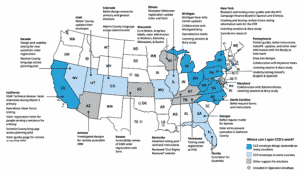Florida Gov. Ron DeSantis signed a bill on Monday that would allow individuals to sue social media platforms if they are “unfairly censored,” and penalize Big Tech companies that de-platform political candidates in the state — aiming to stifle the mammoth corporations’ attempts to “discriminate in favor of the dominant ideology in Silicon Valley.”
The bill would allow for the Florida Election Commission to slam a $250,000 fine per day on social media companies that de-platform any candidate running for statewide office and $25,000 per day for candidates running for non-statewide office.
The legislation — which is slated to take effect on July 1 — would also require companies to give a 30-day warning period before a user is removed and would require companies to publish their standards for blocking and removing users and their content.
“When big tech censors enforce their rules inconsistently to discriminate in favor of the dominant ideology in Silicon Valley, they will be held accountable in the state of Florida, and all Floridians treated unfairly by big tech platforms will have the right to sue companies who violate this law,” he said during a press conference in Miami on Monday.
The move comes in the wake of prominent Republicans alleging tech giants including Facebook, YouTube and Twitter have an anti-conservative bias, accusations that have been amplified following Twitter and Facebook’s decision to ban former President Donald Trump.
DeSantis acknowledged that the bill could benefit Trump, but said it is aimed at addressing a broader range of issues related to tech giants.
“This bill is for everyday Floridians,” he said. “But I do think that’s another issue that has been brought to bear: When you de-platform the president of the United States but you let Ayatollah Khameini talk about killing Jews, that is off.”
The bill is expected to face legal challenges, with critics arguing that the law is a violation of First Amendment and Section 230 of the Communications Decency Act, and some alleging it is a regulatory overreach into private companies’ rights to stop the spread of misinformation and harmful content.
One Desantis administration official dismissed the accusations, telling reporters that they are prepared for challenges in the courts, adding that they are confident that the bill is written in a way that platforms can enforce their codes of conduct, but will need to do so fairly.
“If businesses out there want to restrict lewd, offensive, horrific content, I certainly think they have the opportunity to do that so that they’re doing that in a consistent and fair way treating everybody the same — not just deciding that certain political speech is offensive because it’s something the company disagrees with,” the official told reporters.
“… We do believe that this law is consistent with [Section] 230 and we’ll be prepared for legal challenges that exist.”






